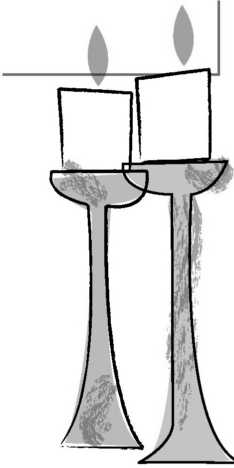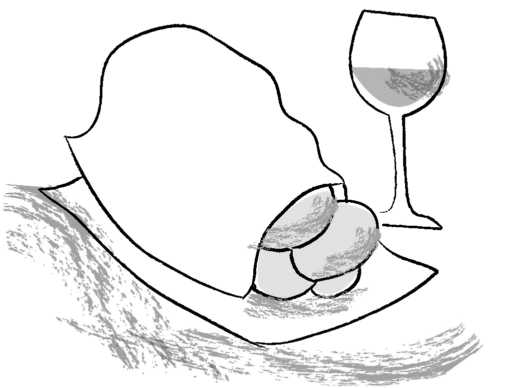Jewish Cooking Boot Camp: The Modern Girl's Guide to Cooking Like a Jewish Grandmother (6 page)
Read Jewish Cooking Boot Camp: The Modern Girl's Guide to Cooking Like a Jewish Grandmother Online
Authors: Andrea Marks Carneiro
Tags: #Cookbooks; Food & Wine, #Entertaining & Holidays, #Special Diet, #Kosher, #Special Occasions, #Religion & Spirituality, #Judaism

1. Soften the first gallon of ice cream and spread three-fourths of the ice cream in the
piecrust.
2. Put the pie back in the freezer for about an hour or until frozen.
3. Soften and spread the second flavor (three-fourths of the gallon) onto the first layer.
4. Freeze for another 2 hours.
5. To serve, remove the pie from the springform pan and decorate with whipped cream (or
prepared topping) and fresh raspberries.
Vanilla and chocolate are always "safe" ice cream flavors, but you can combine any two
flavors you choose.
The pie can be made 1 to 2 days ahead of time. Remove from the freezer about 20 minutes
before you are planning to serve it, as it is easier to cut when thawed a little.
Simple Shabbat Blessings
Blessing over the Candles
Baruch Atah Adonai, Eloheinu Melech Ha'Olam Asher kid'shanu b'mitzvotav v zivanu
l'hadlik ner shel Shabbat.
Blessed are You, Eternal our God, Sovereign of time and space. You hallow us with
Your mitzvot and command us to kindle the lights of Shabbat.
Blessing over the Wine
Baruch Atah Adonai, Eloheinu Melech Ha'Olam, Borei p'ri hagafen.
Praise to You, Eternal our God, Sovereign of the Universe, Creator of the fruit of the
vine.
Blessing over the Challah
Baruch Atah Adonai, Eloheinu Melech Ha'Olam, Hamotzi lechem min ha'aretz.
Our praise to You, Eternal our God, Sovereign of the universe, who brings forth
bread from the earth.


"I once wanted to become an atheist but I gave up ... they have no holidays."
-HENNY YOUNGMAN
Rosh Hashanah is always a major event in the Marks household. For some reason (with the
exception of Passover) it always seems to be the holiday where we have the most guestsmaybe it's the time of year, or the fact that even the most non-religious Jews somehow come
back to the table at the High Holy days. There are always a few extra chairs (and sometimes
tables) set out in Roz's living room. To that end, once again we stick to the classics. The egg
and caviar spread sets a nice Old World tone for the night. The vegetable soup is a comforting way to warm up an autumn night (and incredibly impressive when made from scratch).
Brisket is a staple of any Jewish holiday; this one stays true to the classic ideas of cooking
brisket, but was modified over the years by Grandma Edith. Other classics like noodle pudding and roasted vegetables round out the menu (and offer brisket alternatives), with mandelbrot adding a little fun to the dessert course alongside a traditional honey cake.
Note: If you're having a large group, you can easily add any of the chicken dishes and
salad dressings from other chapters to satisfy those who shy away from red meat. For smaller
groups you may want to cut a dessert and an appetizer.
Moderately Priced Red:
Guigal Cotes du Rhone (Rhone Valley,
France)
Special-Occasion Red:
Yarden Merlot (Israel), Kosher
Moderately Priced White:
Martin Codax Albarino (Rias Baixas, Spain)
Special-Occasion White:
Yarden Odem Chardonnay (Israel), Kosher
1. Rosh Hashanah literally means "head of the year" or "first of the year" and is often
referred to as the Jewish New Year.
2. It marks the beginning of the High Holy Days, the ten-day period of reflection that ends
with Yom Kippur.
3. One of the main traditions of Rosh Hashanah is the blowing of the shofar (a hollowed-out
ram's horn), which not only calls the worshipers to temple but reminds the congregation
to "wake up" from their moral slumber.
4. A main ingredient of a traditional Rosh Hashanah dinner is a round (sometimes raisinfilled) challah, which many say represents the cycle of a new year, as well as apples and
honey for a sweet new year.
5. Aside from "Happy New Year," the traditional wish for friends on Rosh Hashanah is to
say "L'shanah tovah tikatevu v'taychataymu" (may you be written and sealed for a good
year), or the shorter "Shanah tova."
6. Rosh Hashana usually falls in September or October, depending on the year.
• Rosh Hashanah is often thought of as "the birthday of the world," as Jewish tradition says
that the world was created on the first day of Tishri.
• Observant Jews often cast off their sins through the custom of Tashlich (literally "casting
off"), in which they throw bread or bread crumbs into flowing water.
• This being the twenty-first century, you can now cast off your sins online, with a virtual
Tashlich. (Try www.adultjewishlearning.org/ecard.shtml.)
• The holiday "Rosh Hashanah" is never mentioned in the Torah. The holiday is referred to
as Yom Ha-Zikkaron (the day of remembrance) or Yom Teruah (the day of the sounding of
the shofar).
• The shofar is not blown if the holiday falls on Shabbat.
Make the Everyday Sacred
A message from our favorite rabbi, Rachel Greengrass
There I was-exhausted, covered in sweat and sand, and completely blown away by the
beauty that surrounded me. I was in the middle of a spectacular sand desert at an oasis
called La Huacachina. My husband and I were honeymooning in Peru and behind the hotel
was a huge sand dune, the highest in the area, and I wanted to reach the top. While I had
to stop many times I was determined to make it to the top. When we finally did, my breath
was literally taken away. I had seen "deserts" before (I lived in Israel for a year) but none like
this ... there was nothing but sand dunes as far as I could see and then there was a beautiful blue watering hole below us. I was overwhelmed, the moment was beyond words. I said a
prayer: "Barukh atah Adonai Eloheinu melekh Ha'Olam, she-hehiyanu v'kiy'manu v'higi anu
la-z'man ha-ze." (Blessed are You, LORD, our God, Ruler of the universe, who has kept us
alive, sustained us, and enabled us to reach this season.)
Even as a rabbi, I was slightly embarrassed when I asked my husband to say this prayer
with me, but he says he was glad I did. By saying this prayer that Jews say at happy occasions, the moment was made sacred.
Too often we rely on others to tell us what is deserving of the title "sacred," when in fact,
Judaism is intended to be a religion that makes meaning of the lives we are living. Judaism
provides avenues for making the everyday sacred, it reminds us not to take the little things
for granted, and helps us to transform mundane moments into sacred occasions.
I like to encourage people to think of ways to make Judaism their own. You may not
think of yourself as religious or observant, but if you integrate a little Judaism into your
everyday lives, it can help you add meaning, make you more grateful, and bring you closer
to friends and family. One little thing you might do is to have Shabbat dinner at home. This
might simply be a meal with candles, wine, challah, and your favorite dishes and people. It
might mean putting your spare change toward those in need (tzedakah); or it may be saying a blessing when you see something remarkable or when you do something for the first
time. It might mean reminding yourself of your blessings when you wake up in the morning (Birkot HaShachar-morning blessings), or reflecting on your day before you go to bed
at night (bedtime Shema).
The key is to remember that in Judaism there are two kinds of prayer: the keva, or fixed
prayer-the ones we think of when someone says "prayer" that are in our siddurim (prayer
books), that we can read and touch; and then there's kavannah-prayer with intention or
meaning to you personally. Sometimes the prayers we find on the page can be very meaningful, but we should never limit ourselves to the words of others. Prayer should always be a
genuine expression, so don't be scared to allow yourself to say "Blessed are you, Adonai our
God, who has allowed me to fit back into my skinny jeans," or "Thank you, God, for this fabulous recipe that even my mother-in-law enjoys."
And don't be afraid to go off book on the holidays. Being creative and making new traditions is traditional. My husband and I drink four shots of vodka made from grapes on
Passover (same blessing as to the four glasses of wine), and my family does a play of the
Exodus instead of reading the story. Shabbat is a day of rest and relaxation, and we are
taught to make it an oneg-a delight. Think about what that means to you and create some
of your own traditions (spa day, anyone?).
The thing to remember is not to be scared, to try new things, and to remember that
your Judaism should be a meaningful reflection of your real world experiences and your
relationship to God and the world around you. Living a meaningful Jewish life is not an
all-or-nothing experience-try to integrate little things here and there, and see how they
improve your outlook on life, how they give you comfort, and how they give meaning to the
mundane. You don't have to go to an oasis in Peru to find things worth a moment of wonder
and blessing; look at your child, or a dear friend, or be appreciative of that warm cozy blanket. Even using this cookbook is a step toward connecting with the Jewish people.
Barukh atah Adonai Eloheinu melekh Ha'Olam. (Blessed are you, Adonai our God, ruler
of the universe who has given us the opportunity to find blessings all around us.)
Rabbi Rachel Greengrass was ordained from Hebrew Union College-Jewish Institute of Religion and currently serves as part of the clergy team of Temple Beth Ann in Pinecrest, Florida.
An easy inexpensive appetizer that looks impressive because of the caviar. You can serve it
individually on lightly toasted French bread rounds (like a Jewish bruschetta!) or in a mound with
a basket of toasted french bread rounds, party rye, party pumpernickel, or crackers.
1. Mash the eggs and add the grated onion.
2. Add 1%2 to 2 tablespoons mayonnaise, enough to make a spread the consistency of egg salad.
3. Chill in the refrigerator for 1 hour.
4. Cover a serving plate with romaine lettuce.
5. Mound the egg mixture into the center of the plate on top of the lettuce, then spread it out
to 1/ to %2 inch thick.
6. Put a thin layer of sour cream on top of the egg mixture.
7. Top that with a layer of caviar, then a final dollop of sour cream.
8. Serve with bread and/or crackers.
The best way to hard-boil eggs is to place the raw eggs in a pot and cover them with cold
water. Bring to a boil, turn off the heat, and cover the pot. Let sit 14 minutes, then drain.
Run the eggs under cold water, let them cool in an ice bath, and peel.
* Inexpensive grocery store caviar is perfectly fine for this appetizer.
Far from just a holiday favorite, Roz's vegetable soup is the first thing we all ask for when the
weather turns cold (meaning 60s for us Floridians). It's delicious and homey and, though it takes a
lot of work, is definitely worth every chop, slice, and simmer. By the way, the meat is used simply
to enrich the flavor of the broth and is removed before serving.